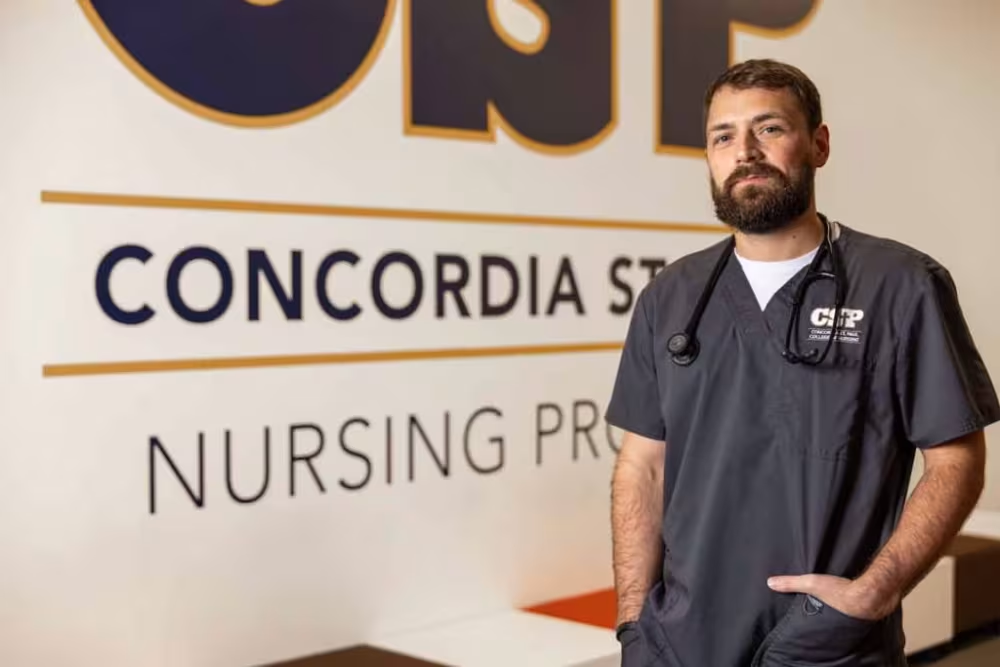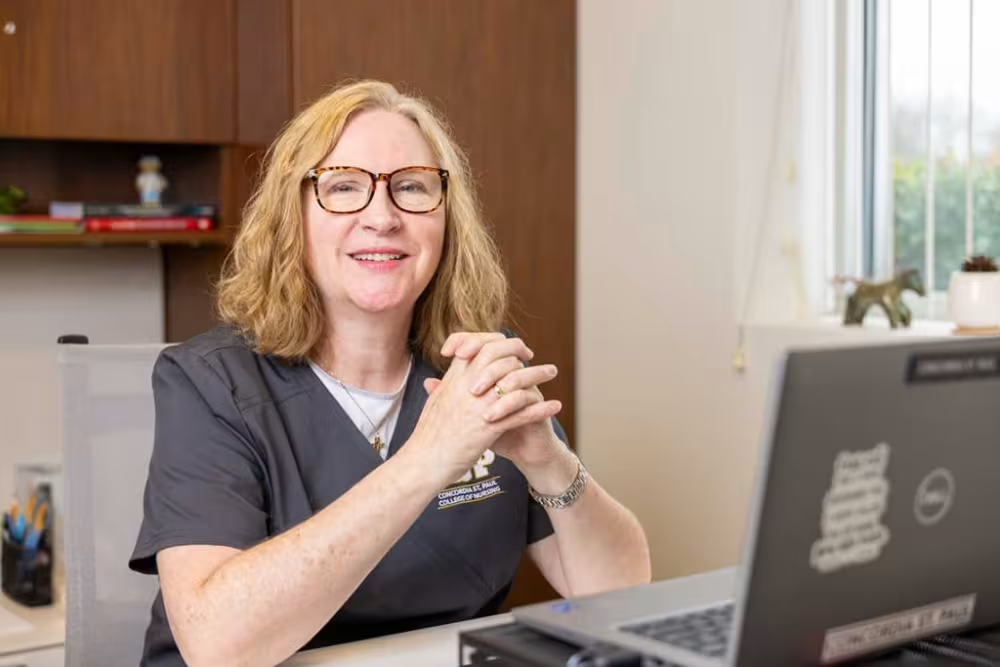Is Nursing a Good Career? What You Need to Know
Each blog post is dated and contains accurate information as of that date. Certain information may have changed since the blog post publication date. If you would like to confirm the current accuracy of blog information, please visit our ABSN overview page or contact admissions at 866-892-1562.
Is nursing a good career? Consider some of the many benefits of a nursing career, like the strong job growth rate, high earning potential, and career flexibility. A career as a nurse also provides opportunities for advancement. For example, you could become an advanced practice registered nurse.

Within the day-in and day-out realities of patient care, nurses save lives, advocate for patients and educate patients and loved ones on their health conditions. Is nursing a good career choice? If you’re interested in a career with advancement potential, strong salary command, and diverse areas of specialization, then it could be right for you.
Even if you’re currently in a different field, it’s possible to switch to a career as a registered nurse (RN) with Concordia University, St. Paul’s Accelerated Bachelor of Science in Nursing (ABSN) program. Here, you can leverage your past non-nursing education to earn a nursing degree in as few as 16 months after completing any necessary prerequisites.
Before deciding if a nursing career is the right choice for you, you should examine the potential benefits of making this transition like high job growth rate and career flexibility. You’ll also want to get the answers to frequently asked questions, such as “How hard is nursing school?”
Why Become a Nurse? Consider These Top Benefits
Every nursing student has their own personal reasons for pursuing an RN career, but these are some of the most common factors to consider.

It’s never too late to become a nurse! See how a student returned to Concordia University, Portland to earn her nursing degree at 50.
Strong Workforce Growth
There is a current nursing shortage in the U.S. that is expected to continue for the foreseeable future. According to the U.S. Bureau of Labor Statistics (BLS), the job growth rate for all types of RNs is expected to be 6% from 2023 through 2033, faster than the average for all professions. At this rate of job growth, the economy will add about 197,200 new nursing positions during this time period.
High Earning Potential
Why become a nurse? Another reason is the strong salary in this career field. According to the BLS, the median annual salary for RNs was $93,600 as of May 2024. If you pursue career advancement opportunities, this can continue to rise. The BLS states that most types of advanced practice registered nurses (APRNs) made a median annual salary of $132,050 as of May 2024.
Career Flexibility
Nursing can be flexible regarding both workplace settings and scheduling. You can choose a part-time or full-time position, with day, evening, and overnight shifts. You can elect to work in a hospital, outpatient, or non-traditional setting. There are positions available in cities, suburbs, or rural areas.
There are also plenty of nursing specialties to choose from, such as:
- Cardiac care
- Emergency care
- Hematology
- Labor and delivery
- Nephrology
- Oncology
- Pediatrics
- Public Health

Well-Respected Profession
Nursing is a career you can be proud of. A Gallup poll shows that nursing has been voted the most respected profession for 23 years running. The poll results reflect the widely held public view that nurses practice with integrity and ethics.
FAQs About Nursing Careers
Despite these benefits, you might still wonder “Is nursing a good career for me?” Getting the answers to common questions about RN careers can help you decide.

Explore 9 nursing specialties that are in demand today.
Is There Room for Advancement?
There is plenty of room for advancement in nursing, with management positions accessible as you gain expertise as an RN. After earning a BSN degree and gaining experience as a practicing nurse, you could also pursue a Master of Science in Nursing (MSN) or Doctor of Nursing Practice (DNP). These graduate-level degrees can allow you to pursue career advancement opportunities.
For example, you could become an advanced practice registered nurse (APRN). These nursing roles have greater autonomy and practice authority than RNs. They serve as nurse leaders, patient advocates, researchers, and organizational change-makers.
Three common types of advanced practice nurses are nurse practitioners (NPs), nurse anesthetists (CRNAs), and nurse midwives (CNMs).
Nurse practitioners can specialize in areas such as adult/gerontology, psychiatric mental health, cardiology, pediatrics, family practice, and women’s health. They are patient educators and advocates, providing care independently in some settings. Depending on their state, they can hold prescribing authority.
Nurse midwives fulfill the role of gynecologists in many cases. They help women with contraception and regular gynecologic care, as well as all stages of pregnancy. They provide prenatal visits and exams, postpartum care for the mother and baby, and childbirth assistance. Their level of autonomy depends on their state and clinical setting.
Nurse anesthetists provide anesthesia to patients in a wide array of settings, including surgery. They work with patients of all ages at all levels of care.
How Hard Is Nursing School?
Nursing school is challenging, but that shouldn’t discourage you from switching to a nursing career. You’ll likely need to complete some prerequisite courses, which ensure you have the right academic foundation to succeed in nursing school. Once you’re enrolled, CSP’s dedicated nursing instructors and student support services can help you reach your goal.

How Can I Start a Career as a Nurse?
If you have a completed non-nursing bachelor’s degree or a minimum of 54 college credits, the ABSN program at Concordia University, St. Paul could allow you to earn a bachelor’s degree in as few as 16 months. We offer three start dates per year, in January, May, and September, so that you can begin your nursing education sooner.
You may be wondering how we can fit two years of traditional nursing education into 16 months. One way is to eliminate long breaks between semesters, which also keeps students engaged throughout the program.
In addition, our ABSN program builds on your previous college education. If you have already completed general education requirements, you can focus on our nursing-specific curriculum.
Our Educational Model
Our ABSN program follows a blended learning model, with online coursework, immersive labs, and clinical learning experiences.
Our online coursework comprises a combination of carefully curated activities and assignments, quizzes, 3-D animations, interactive components, and online discussion boards. The result is an engaging, web-based learning experience in the fundamentals of nursing.
On-campus nursing skills labs allow students to practice the nursing skills they’ve learned in controlled learning spaces. These include performing physical assessments, completing histories, inserting catheters, administering all medication forms, dressing wounds, and inserting IVs.
The third component of our learning model is clinical learning experiences. Concordia University, St. Paul has joined forces with respected clinical partners to place students in nearby healthcare facilities and community-based sites where they can provide patient care and network with potential employers.
Clinical learning experiences begin in the first semester of our ABSN program and include diverse nursing experiences providing holistic care in settings which may include:
- Acute Care
- Adult Health
- Community/Public Health
- Health Promotion/Education
- Obstetrics
- Pediatrics
Clinical learning experiences provide opportunities to put the nursing theory lessons you learned online into practice.

At the beginning of your clinical experience, you’ll learn from licensed nurses, documenting the care and skills needed to promote health in your patients. You’ll also learn how to handle patients safely and help them with activities of daily living (ADLs).
As your online coursework becomes more complex, so will your clinical experiences. Eventually, you’ll take on greater responsibilities and a more direct-care role with patients.
After completing 720 hours of clinical care and 270 hours of skills lab practice, you’ll graduate from our 16-month ABSN program ready to sit for the NCLEX licensure exam. When you pass this exam, you can obtain your state-issued nursing license and begin your new career as a nurse.
Get Started Today at Concordia University, St. Paul
We offer an accelerated nursing education infused with values that promote ethical, compassionate, and competent patient care. Our hybrid learning approach makes higher education more accessible, while our rolling admissions, three start dates per year, and personalized admissions assistance make it easier than ever to get started pursuing your new career.
Contact an admissions advisor at Concordia University, St. Paul today to pursue your nursing career.
